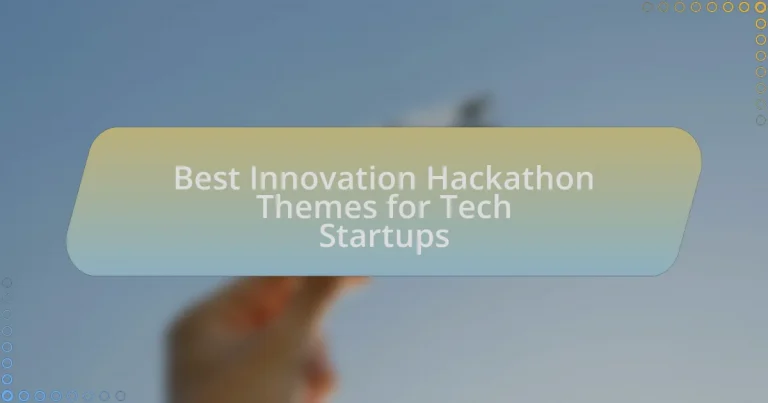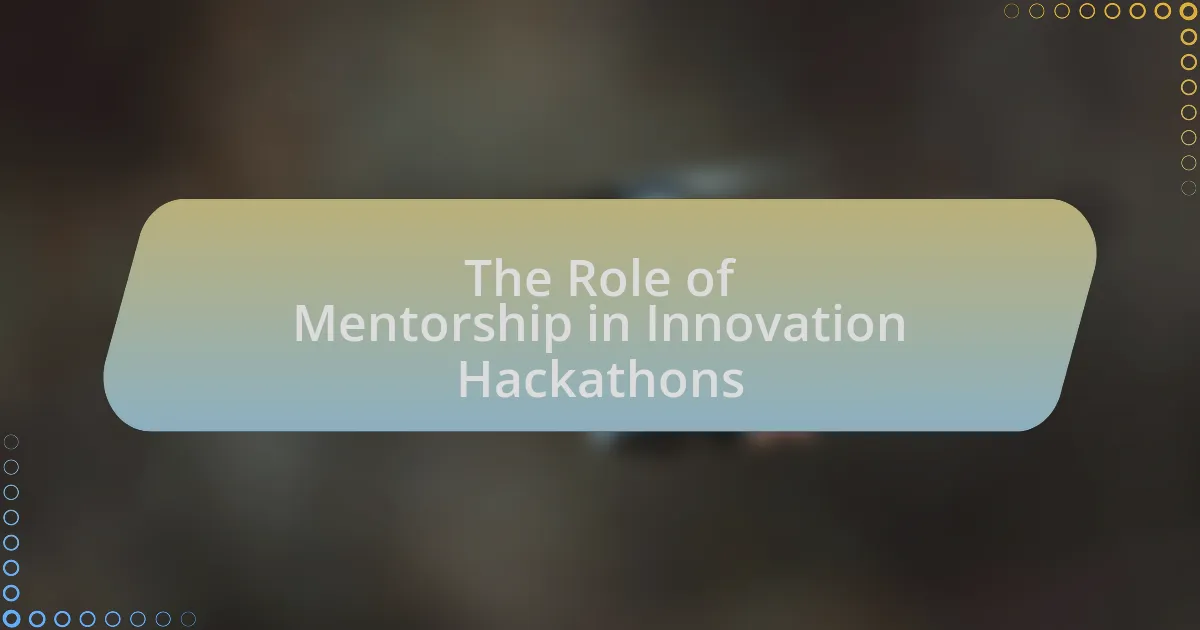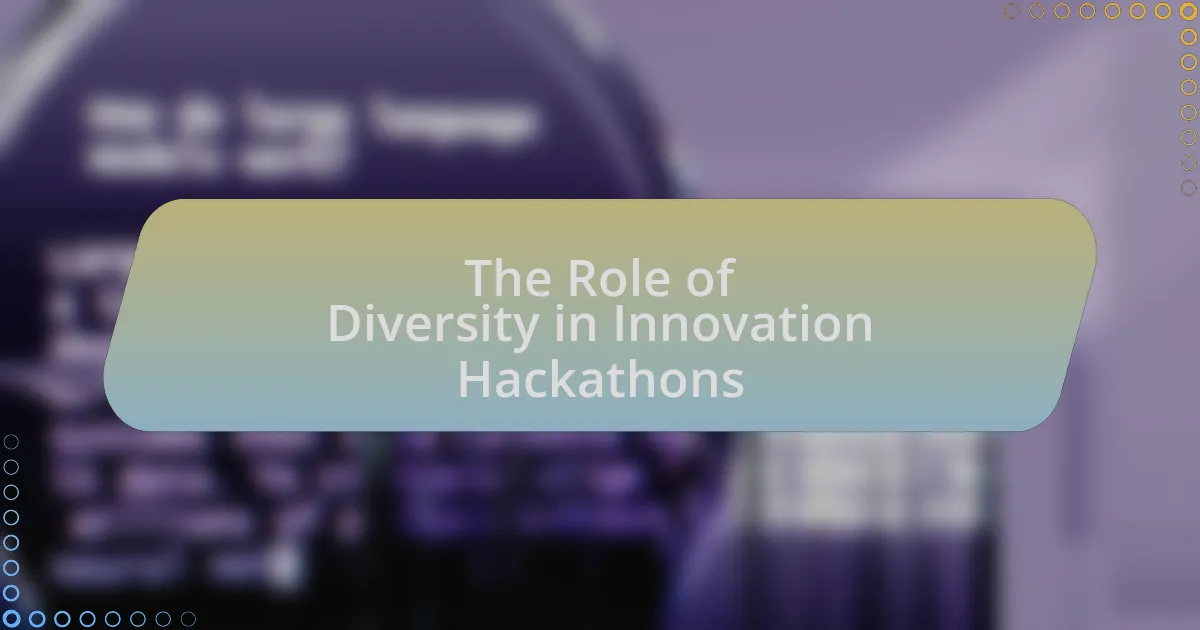The article focuses on the best innovation hackathon themes for tech startups, highlighting key areas such as Artificial Intelligence, Blockchain Technology, Internet of Things (IoT), Health Tech, and Sustainability Solutions. It emphasizes the importance of themes in guiding participant engagement, fostering creativity, and aligning projects with industry trends. The article also discusses how startups can select relevant themes, the impact of target audience considerations, and best practices for implementing these themes effectively. Additionally, it addresses the unique challenges faced by startups in specific sectors like healthcare and fintech, and the role of feedback in refining future hackathon themes.
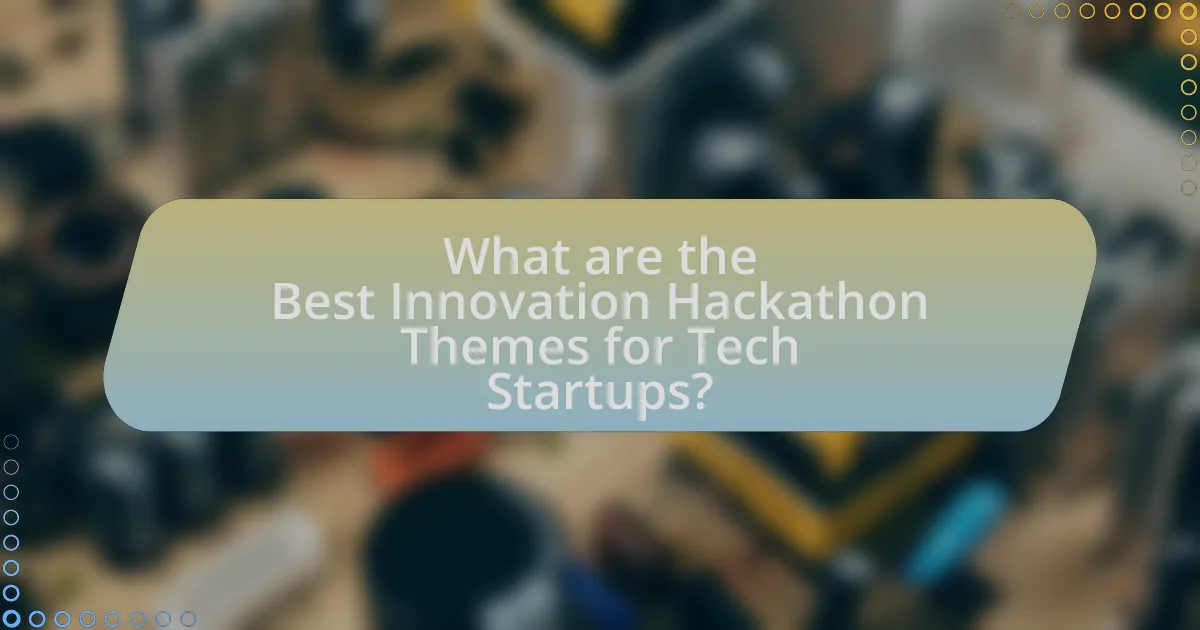
What are the Best Innovation Hackathon Themes for Tech Startups?
The best innovation hackathon themes for tech startups include Artificial Intelligence, Blockchain Technology, Internet of Things (IoT), Health Tech, and Sustainability Solutions. These themes are relevant as they address current market demands and technological advancements. For instance, the AI theme allows startups to explore machine learning applications, which is a rapidly growing field projected to reach $190 billion by 2025. Blockchain technology offers solutions for secure transactions and data integrity, with the global market expected to grow to $69 billion by 2027. IoT focuses on connectivity and smart devices, which are integral to modern living. Health Tech innovations can improve patient care and streamline healthcare processes, while Sustainability Solutions address environmental challenges, appealing to a socially conscious consumer base. Each of these themes not only fosters creativity but also aligns with industry trends, making them ideal for hackathons aimed at tech startups.
Why are themes important for hackathons in tech startups?
Themes are important for hackathons in tech startups because they provide a focused direction that aligns participants’ efforts with specific goals and challenges. By establishing a theme, organizers can stimulate creativity and innovation, guiding teams to develop solutions that address relevant industry issues or emerging trends. For instance, a theme centered around sustainability can lead to the creation of eco-friendly technologies, which is increasingly vital in today’s market. This targeted approach not only enhances the quality of the projects developed but also fosters collaboration among participants who share similar interests, ultimately driving impactful outcomes that can benefit the startup ecosystem.
How do themes influence participant engagement and creativity?
Themes significantly influence participant engagement and creativity by providing a focused context that stimulates innovative thinking. When participants are presented with a specific theme, it narrows their scope of exploration, allowing them to channel their ideas and efforts more effectively. Research indicates that themed environments can enhance motivation and collaboration among participants, as they feel a shared purpose and direction. For instance, a study published in the Journal of Business Research found that thematic framing in collaborative settings leads to increased idea generation and problem-solving capabilities, as participants are more likely to build upon each other’s contributions within a defined context. Thus, well-chosen themes not only engage participants but also foster a creative atmosphere conducive to innovation.
What role do themes play in aligning projects with industry trends?
Themes serve as a strategic framework that guides projects to align with prevailing industry trends. By establishing a clear thematic focus, projects can address specific market needs, ensuring relevance and competitiveness. For instance, themes such as sustainability or artificial intelligence reflect current industry priorities, enabling startups to innovate in ways that resonate with consumer demands and regulatory expectations. This alignment not only enhances project viability but also increases the likelihood of attracting investment and partnerships, as evidenced by the growing emphasis on green technologies in funding initiatives.
What are some popular themes for tech startup hackathons?
Popular themes for tech startup hackathons include artificial intelligence, blockchain technology, health tech, sustainability, and fintech. These themes are prevalent due to the growing demand for innovative solutions in these sectors. For instance, artificial intelligence is increasingly utilized for automation and data analysis, while blockchain technology is recognized for its potential in secure transactions. Health tech focuses on improving healthcare delivery through digital solutions, sustainability addresses environmental challenges, and fintech aims to enhance financial services through technology. Each theme reflects current trends and challenges in the tech industry, making them attractive for participants seeking to create impactful projects.
How can sustainability be integrated into hackathon themes?
Sustainability can be integrated into hackathon themes by focusing on challenges that address environmental issues, promote renewable energy, and encourage sustainable practices. For instance, themes could include developing solutions for waste reduction, creating apps for carbon footprint tracking, or innovating in sustainable agriculture technologies. Research indicates that hackathons centered around sustainability not only foster creativity but also attract participants who are passionate about environmental impact, as seen in events like the Global Hackathon for Climate Action, which successfully generated over 100 innovative projects aimed at climate solutions.
What are the benefits of focusing on artificial intelligence as a theme?
Focusing on artificial intelligence as a theme offers significant benefits, including enhanced problem-solving capabilities and increased innovation potential. AI technologies can analyze vast amounts of data quickly, leading to more informed decision-making and the development of novel solutions. For instance, a study by McKinsey & Company found that AI could potentially add $13 trillion to the global economy by 2030, highlighting its transformative impact across various sectors. Additionally, engaging with AI fosters collaboration among diverse teams, driving creativity and accelerating the development of cutting-edge applications. This collaborative environment is essential for tech startups aiming to leverage AI for competitive advantage.
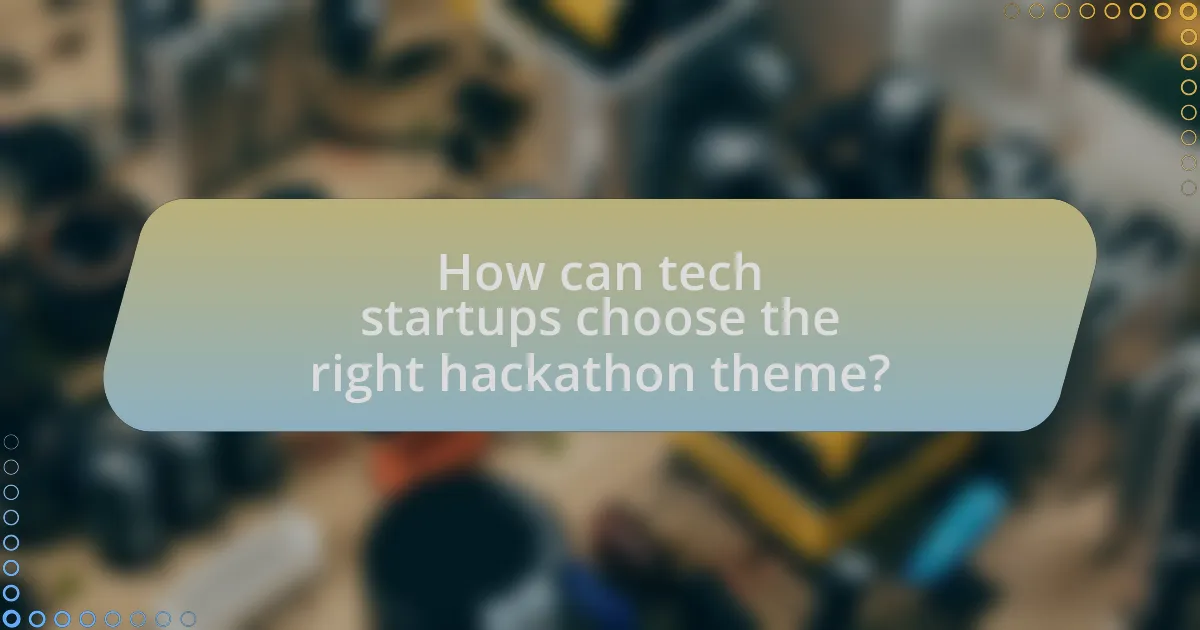
How can tech startups choose the right hackathon theme?
Tech startups can choose the right hackathon theme by aligning it with their core business objectives and current industry trends. This alignment ensures that the theme resonates with participants and addresses relevant challenges. For instance, a startup focused on sustainability might select a theme centered on green technology, which not only attracts like-minded innovators but also fosters solutions that could enhance their product offerings. Additionally, analyzing past successful hackathons can provide insights into popular themes and participant engagement, further guiding startups in their selection process.
What factors should startups consider when selecting a theme?
Startups should consider market relevance, target audience, and innovation potential when selecting a theme. Market relevance ensures that the theme addresses current trends and demands, which can enhance engagement and interest. Understanding the target audience helps tailor the theme to their needs and preferences, increasing the likelihood of participation and support. Innovation potential is crucial as it encourages creative solutions and differentiates the startup in a competitive landscape. For instance, a theme focused on sustainable technology aligns with growing environmental concerns, making it more appealing to both participants and investors.
How does the target audience impact theme selection?
The target audience significantly influences theme selection by determining the relevance and appeal of the themes to participants. When organizers understand the demographics, interests, and needs of their audience, they can choose themes that resonate, ensuring higher engagement and participation. For instance, a hackathon aimed at young entrepreneurs may focus on themes like sustainability or social impact, reflecting current trends and values among that demographic. Research indicates that aligning themes with audience interests can increase participation rates by up to 30%, demonstrating the importance of audience consideration in theme selection.
What resources are available to help in theme selection?
Resources available to help in theme selection for hackathons include online platforms, industry reports, and community forums. Online platforms like Hackathon.com and Devpost provide curated lists of themes and past hackathon projects, which can inspire new ideas. Industry reports from organizations such as Gartner and McKinsey offer insights into current technology trends and challenges, helping to align themes with market needs. Additionally, community forums on platforms like Reddit and Discord allow participants to discuss and share theme ideas, fostering collaboration and creativity. These resources collectively support informed and innovative theme selection for tech startups.
How can themes be tailored to specific industries?
Themes can be tailored to specific industries by aligning them with the unique challenges, trends, and needs of that sector. For instance, in the healthcare industry, themes could focus on telemedicine innovations or patient data security, addressing current demands for improved healthcare delivery and data protection. Similarly, in the finance sector, themes might center around blockchain technology or financial inclusion, reflecting the industry’s shift towards digital solutions and accessibility. This targeted approach ensures that the themes resonate with participants, fostering relevant discussions and innovative solutions that are directly applicable to the industry’s context.
What are the unique challenges faced by startups in the healthcare sector?
Startups in the healthcare sector face unique challenges such as regulatory compliance, funding difficulties, and market entry barriers. Regulatory compliance is particularly complex due to stringent laws like HIPAA in the U.S., which mandates strict data privacy and security measures. Additionally, securing funding is often challenging, as investors may be hesitant to invest in healthcare innovations due to high risks and long development timelines. Market entry barriers include the need for extensive clinical trials and validation processes, which can delay product launches and increase costs. These factors collectively hinder the agility and scalability of healthcare startups compared to those in less regulated industries.
How can fintech startups leverage themes to address regulatory issues?
Fintech startups can leverage themes such as compliance automation, data privacy, and risk management to address regulatory issues effectively. By focusing on compliance automation, these startups can develop solutions that streamline adherence to regulations, reducing the burden of manual compliance processes. For instance, utilizing machine learning algorithms can help identify and mitigate risks associated with financial transactions, ensuring compliance with anti-money laundering (AML) regulations. Additionally, emphasizing data privacy themes allows fintech companies to create products that align with regulations like the General Data Protection Regulation (GDPR), thereby enhancing consumer trust and reducing legal risks. These approaches not only facilitate regulatory adherence but also position fintech startups as innovative leaders in the financial services industry.
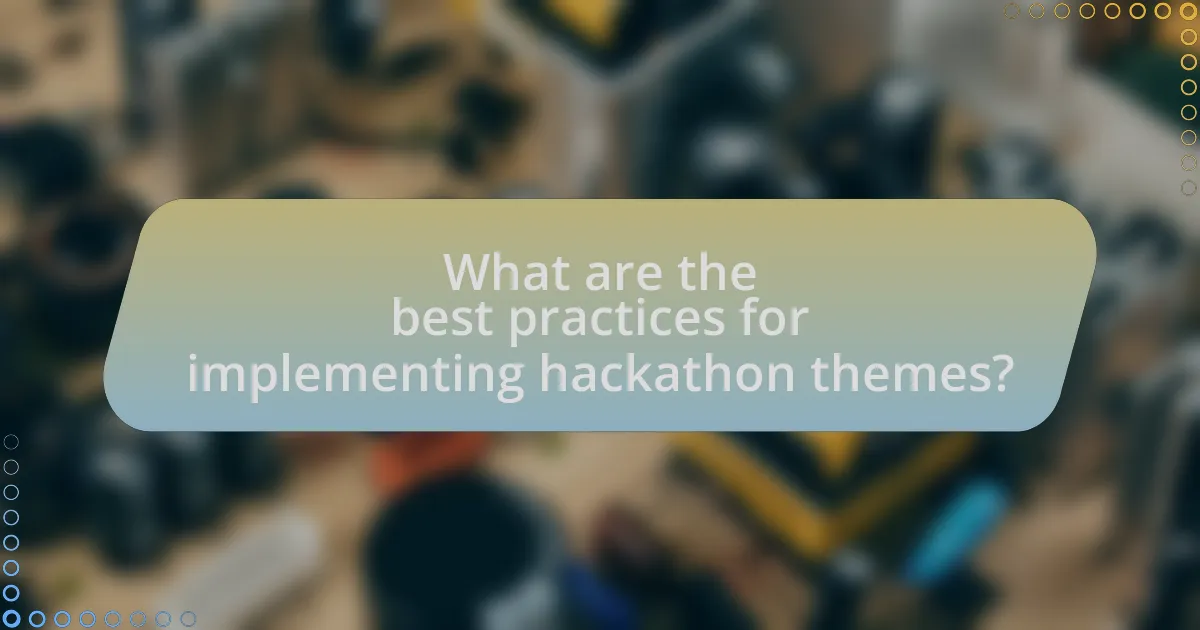
What are the best practices for implementing hackathon themes?
The best practices for implementing hackathon themes include clearly defining the theme, ensuring it aligns with participants’ interests, and providing relevant resources. A well-defined theme guides participants and fosters creativity, while alignment with interests increases engagement and motivation. Providing resources, such as mentorship and access to tools, enhances the development process and leads to more innovative solutions. For instance, a study by the University of California found that hackathons with clear themes and adequate support resulted in a 30% increase in project quality and participant satisfaction.
How can startups effectively communicate their chosen theme?
Startups can effectively communicate their chosen theme by clearly defining their core message and aligning it with their branding and marketing strategies. This involves creating a consistent narrative that resonates with their target audience, utilizing various channels such as social media, blogs, and presentations to convey their theme. For instance, a startup focusing on sustainability can highlight its commitment through storytelling, showcasing its eco-friendly practices and products. Research indicates that 70% of consumers prefer brands that share their values, underscoring the importance of authentic communication in establishing a strong connection with the audience.
What strategies can be used to ensure participants understand the theme?
To ensure participants understand the theme of a hackathon, clear communication of the theme through multiple channels is essential. This can be achieved by providing detailed written materials, such as guidelines and FAQs, and conducting pre-event briefings or webinars to explain the theme and its relevance. Additionally, using visual aids like infographics or videos can enhance comprehension. Research indicates that participants retain information better when it is presented in various formats, as supported by studies on multimedia learning (Mayer, 2001). Engaging participants in discussions and Q&A sessions also fosters a deeper understanding of the theme, allowing for clarification of any uncertainties.
How can themes be incorporated into the judging criteria?
Themes can be incorporated into the judging criteria by defining specific metrics that align with each theme’s objectives. For example, if a hackathon theme focuses on sustainability, judges can evaluate projects based on their environmental impact, innovation in resource usage, and scalability of sustainable practices. This approach ensures that the judging criteria are directly relevant to the theme, allowing for a more focused assessment of participants’ work. Additionally, incorporating themes into the criteria can enhance engagement and creativity among participants, as they are encouraged to explore solutions that resonate with the chosen theme.
What common pitfalls should startups avoid when choosing themes?
Startups should avoid selecting themes that lack relevance to their target audience. Choosing a theme that does not resonate with potential users can lead to disengagement and wasted resources. For instance, a survey by the Startup Genome Project indicates that 70% of startups fail due to a lack of market need, highlighting the importance of aligning themes with user interests and needs. Additionally, startups should steer clear of overly broad themes that dilute focus, as specificity can drive innovation and actionable outcomes. Research shows that focused themes can enhance participant engagement and lead to more viable solutions, reinforcing the need for clarity in theme selection.
How can overly broad themes dilute focus and creativity?
Overly broad themes dilute focus and creativity by creating ambiguity and reducing specificity in problem-solving. When themes are too expansive, participants struggle to identify clear objectives, leading to scattered ideas and diminished innovation. Research indicates that focused themes enhance creativity by providing clear parameters, allowing teams to channel their efforts effectively. For instance, a study published in the Journal of Business Research found that specific goal-setting significantly improves creative performance compared to vague objectives. Thus, precise themes are essential for maximizing creativity and maintaining focus in innovation contexts like hackathons.
What are the risks of selecting themes that lack relevance to participants?
Selecting themes that lack relevance to participants can lead to disengagement and reduced participation. When participants do not find the themes applicable to their interests or needs, they are less likely to invest time and effort into the event, resulting in lower quality outputs and innovation. Research indicates that relevance significantly influences motivation and engagement levels; for instance, a study published in the Journal of Educational Psychology found that participants are more likely to engage deeply when the content is aligned with their personal or professional goals. Additionally, irrelevant themes can lead to wasted resources, as organizers may spend time and money on themes that do not resonate, ultimately diminishing the overall impact and success of the hackathon.
What tips can enhance the success of hackathon themes for tech startups?
To enhance the success of hackathon themes for tech startups, it is crucial to align themes with current industry trends and challenges. By focusing on relevant topics such as artificial intelligence, sustainability, or blockchain, startups can attract participants who are motivated and knowledgeable about these areas. Research indicates that hackathons centered around trending technologies yield higher engagement and innovative solutions, as seen in events like the TechCrunch Disrupt Hackathon, where themes aligned with emerging tech led to a 30% increase in viable project submissions. Additionally, providing clear guidelines and resources can facilitate better outcomes, as participants are more likely to succeed when they understand the objectives and have access to necessary tools.
How can collaboration with industry experts improve theme relevance?
Collaboration with industry experts enhances theme relevance by integrating current market insights and trends into the development process. This partnership allows tech startups to align their hackathon themes with real-world challenges and opportunities, ensuring that the themes resonate with both participants and potential investors. For instance, industry experts can provide data on emerging technologies or consumer needs, which can be directly reflected in the hackathon themes. Research indicates that startups that engage with industry professionals are 30% more likely to develop solutions that meet market demands, thereby increasing the likelihood of successful outcomes.
What role does feedback play in refining hackathon themes for future events?
Feedback plays a crucial role in refining hackathon themes for future events by providing insights into participant experiences and preferences. This information allows organizers to identify successful elements and areas needing improvement, ensuring that future themes resonate more effectively with participants. For instance, post-event surveys often reveal which themes generated the most engagement and innovation, guiding the selection of future topics. Additionally, analyzing feedback trends can highlight emerging interests in technology and innovation, enabling organizers to stay relevant and appealing to tech startups.
